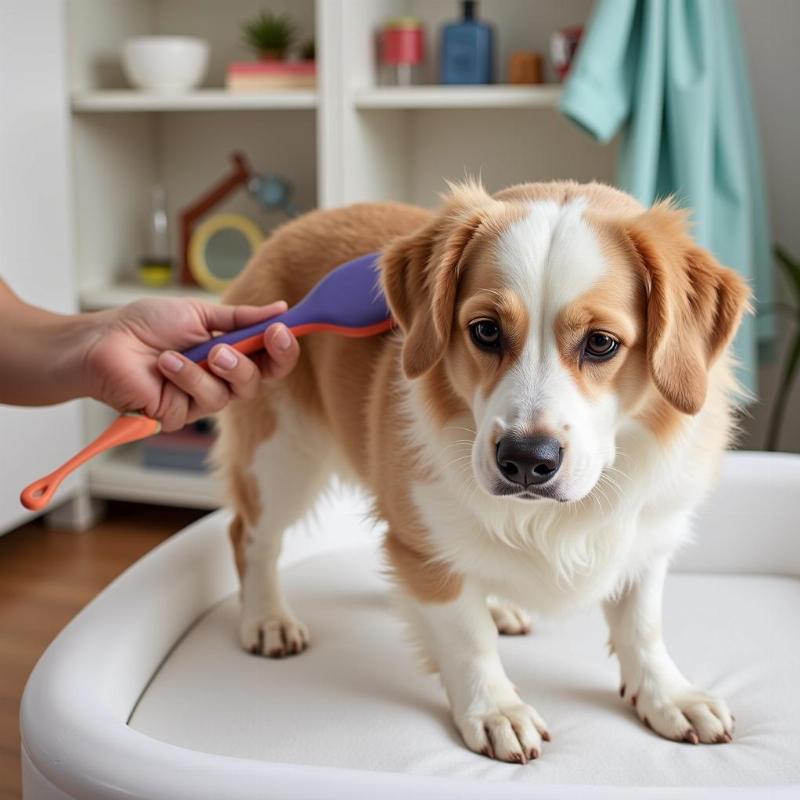Antifungal sprays for dogs are essential tools for pet owners dealing with pesky fungal infections. These infections can cause discomfort, itching, and even hair loss, impacting your furry friend’s quality of life. Choosing the right antifungal spray and understanding proper usage is crucial for effective treatment. This guide provides valuable information on selecting, applying, and maximizing the benefits of antifungal sprays for dogs in the US.
Understanding Fungal Infections in Dogs
Fungal infections, also known as mycoses, are a common problem in dogs. They can range from mild skin irritations to serious systemic illnesses. Recognizing the signs early on is key to preventing further complications. Symptoms often include redness, itching, scaling, hair loss, and a musty odor. Common types of fungal infections in dogs include ringworm, yeast infections, and blastomycosis.
Choosing the Right Anti-Fungal Spray for Your Dog
Selecting an appropriate antifungal spray depends on various factors, including the type of infection, the severity, and your dog’s overall health. Always consult with a veterinarian before starting any new treatment. They can diagnose the specific type of fungus and recommend the most effective product. Several over-the-counter antifungal sprays are available in the US, but a prescription might be necessary for more persistent infections.
Key Considerations When Choosing a Spray
- Ingredients: Look for sprays containing active ingredients like miconazole, ketoconazole, or clotrimazole.
- Vet Recommendation: Always prioritize your veterinarian’s guidance.
- Dog’s Sensitivity: Consider any known allergies or sensitivities your dog may have.
- Severity of Infection: Mild cases might respond to over-the-counter options, while severe infections require prescription medications.
How to Apply Anti-Fungal Spray for Dogs
Proper application is crucial for the effectiveness of antifungal sprays. Follow these steps:
- Clean the Affected Area: Gently clean the infected area with a mild, pet-safe cleanser.
- Dry Thoroughly: Ensure the area is completely dry before applying the spray.
- Apply the Spray: Hold the spray bottle a few inches away from your dog’s skin and apply a thin, even layer.
- Prevent Licking: Use an Elizabethan collar (cone) if your dog tends to lick the treated area.
- Follow Vet’s Instructions: Adhere to the recommended dosage and frequency provided by your veterinarian.
When to Seek Veterinary Care
While some fungal infections can be managed with over-the-counter sprays, it’s essential to know when to seek professional help. Consult your veterinarian if:
- The infection doesn’t improve after a week of treatment.
- The infection worsens or spreads.
- Your dog experiences significant discomfort or pain.
- Your dog develops other symptoms, such as fever or lethargy.
Preventing Fungal Infections in Dogs
Maintaining good hygiene and a healthy environment can help prevent fungal infections. Regular grooming, a balanced diet, and avoiding contact with infected animals are crucial preventative measures.
 Preventing Fungal Infections in Dogs
Preventing Fungal Infections in Dogs
Conclusion
Antifungal sprays are valuable tools for managing fungal infections in dogs. By understanding the different types of infections, choosing the right product, and applying it correctly, you can effectively treat your dog’s fungal infection and restore their comfort and well-being. Remember to always consult with your veterinarian for accurate diagnosis and treatment recommendations. Proper care and prevention are essential for a happy and healthy canine companion.
FAQ
- What are the common signs of a fungal infection in dogs? Bold text: Common signs include redness, itching, scaling, hair loss, and a musty odor.
- Can I use human antifungal sprays on my dog? Bold text: No, using human antifungal sprays on dogs can be harmful. Always use products specifically formulated for pets.
- How long does it take for an antifungal spray to work? Bold text: Improvement can be seen within a week, but complete resolution may take several weeks.
- Can antifungal sprays be used preventatively? Bold text: Discuss preventative measures with your veterinarian. In some cases, they might recommend specific products or practices.
- What should I do if my dog licks the treated area? Bold text: Use an Elizabethan collar to prevent licking and ensure the medication can work effectively.
- Are all antifungal sprays the same? Bold text: No, different sprays contain various active ingredients and are formulated for specific types of fungal infections.
- Can diet affect my dog’s susceptibility to fungal infections? Bold text: A balanced diet supports a healthy immune system, which can help prevent infections.
Related Articles
- antibacterial and antifungal spray for dogs
- antiseptic and antifungal spray for dogs
- antibiotic spray for dog skin infection
- miconahex triz spray for dogs & cats
Beautdogs.us is your premier online destination for comprehensive dog care information, breed insights, and product recommendations. We cater to both novice and experienced dog owners, offering a trusted resource for all your canine needs. From grooming tips to health advice, Beautdogs.us empowers you to provide the best care for your furry friend. Contact us today for personalized support and expert advice! Email: [email protected], Phone: +1 501-555-7529.